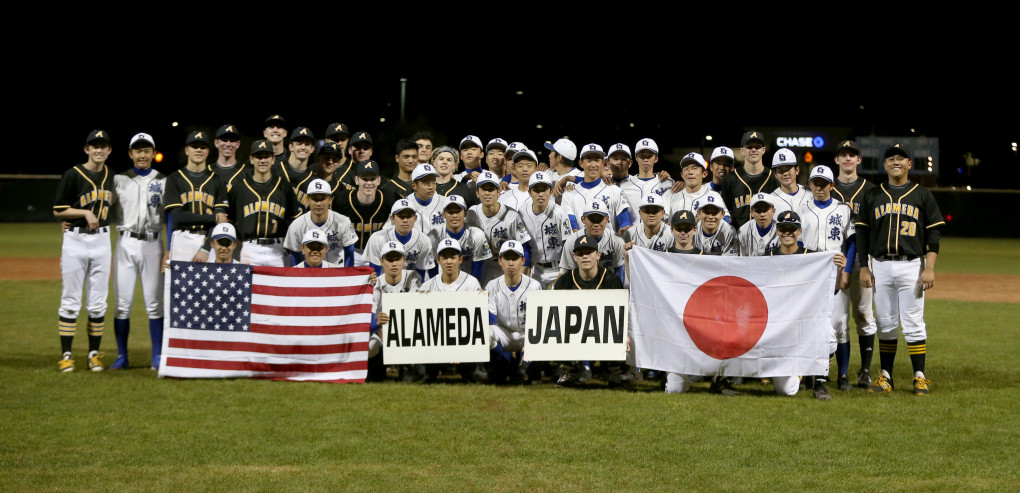Japanese, Alameda High School (California) ballplayers share love of baseball
March 8, 2017 The Mercury News

ALAMEDA — Some still refer to baseball as our national pastime. In Japan, it’s more than thatYes, Japanese professional baseball has a big following. So does high school baseball. The quality of play makes it easy to see whyPlayers take the field highly prepared physically and mentally, combining a disciplined — what some might even call, an academic — approach with a deep love and respect for baseball. A strict attention to fundamentals offensively and defensively quickly becomes apparent even to the most casual observer. In short, teams strive to play a level of prep baseball that few here ever have seenAlameda recently received a taste of this when the Fukuoka Jyoto High School team visited the Island. Between arriving on March 2 and departing Wednesday, Fukuoka Jyoto played a series of scrimmages at College of Alameda against its Alameda and Encinal high school counterpartsEven the locals came away impressed. On March 3, for instance, the visitors opened with an 11-0 win over Alameda High’s junior varsity team in the afternoon, then prevailed 10-2 over the Hornets varsity in the nightcapDespite the rigors of travel and feasting on the goodies provided by the Alameda families with whom they stayed, Fukuoka Jyoto players still displayed quality all over the field. Overall, the scrimmages looked every bit a showcase of two distinct baseball cultures“We’re not going to face a better high school team than we did today,” Hornets coach Ken Arnerich said. “This team we played today is a baseball school. They practice three hours a day before school and five hours after school. They bring in kids from all over the country; they have dormitories at the school. At a young age, they are better than us fundamentally.International baseball at all levels — including this month’s quadrennial World Baseball Classic among the top professionals — offers a study in cultural contrasts. Some argue the Japanese regard a baseball field as a place of honor. At the very least, those at this past weekend’s scrimmages readily saw that Fukuoka Jyoto treated the game with a respect typically given to any serious academic pursuit. But the visitors did not simply play by rote memory, but rather as students of the game enjoying baseball to the fullest“At this level, we spend more time playing games in Japan,” Fukuoka Jyoto head coach Munekazu Yamamoto said through the translation of assistant professor Takatoshi Higuchi of the Fukuoka Institute of Technology (FIT), to which Fukuoka Jyoto is attached. “We are more mature (in terms of baseball) at this age level … which doesn’t mean we are better. We learn more at an earlier age, which (U.S. players) will learn at a later age.Students in Japan attend three years of high school before heading to universities (Fukuoka Jyoto brought only first- and second-year students to Alameda). Some of the schools specialize in physical education, of which baseball is part of the curriculum. And though Fukuoka Jyoto, a private school of about 2,000 students, does not offer credit for baseball, the game still looms large“I’ve been there four times, and (baseball’s) amazingly big,” said Hornets assistant Rich Krinks. “(Fukuoka Jyoto) has 105 players in its program. If they go to the national championship at Koshien (Hanshin Koshien Stadium in Nishinomiya this summer), they will have played maybe 100 games.A spring invitational also takes place at the same location, and upward of 50,000 spectators sometimes pack the stands for games of both tournaments, which also receive national television coverage“Baseball over there is everything; you just can’t describe it,” said Arnerich, whose Hornets traveled to Fukuoka — and stayed in Fukuoka Jyoto’s dormitories — during the 2008 spring break“When we went over there, (Fukuoka Jyoto) treats you like royalty,” Arnerich said. “They roll out the red carpet for you. They’re very generous hosts.The Hornets had hoped to return in 2011, but travel restrictions brought on by the Japan earthquake and tsunami that struck three days before the scheduled trip led to cancellation. Still, Arnerich hopes to bring his team to Fukuoka Jyoto again at some future time. In the meantime, Fukuoka Jyoto’s visit to Alameda served to reciprocate for 2008For its part, Fukuoka Jyoto exposed Alameda and Encinal players to a level of high school baseball they likely never will see in league, tournament and sectional play. Alamedans responded with their own special Island hospitality“It’s a very beautiful city,” Yamamoto said of Alameda through Higuchi’s translation. “We’re very fortunate to have friends overseas. This is a rare opportunity for (our players). We’re looking forward for (Alameda) to come to Japan. We’re looking forward to playing more games in the future.rn



